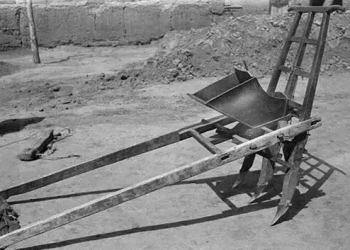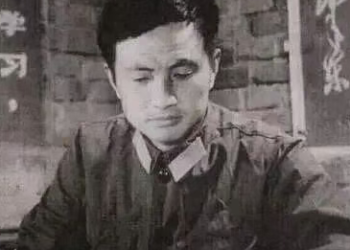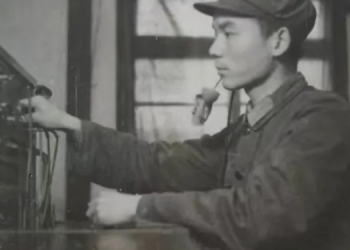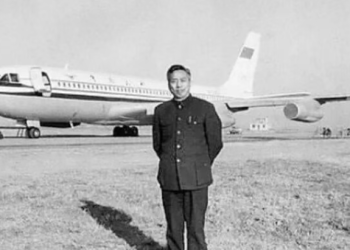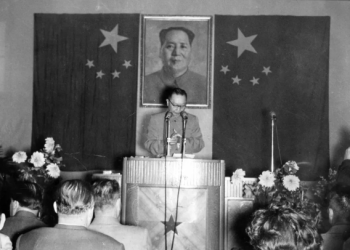In the grassroots political work team, he was a young “new recruit,” yet his achievements were truly remarkable. In October 1984, he was “recruited” from his position as a training staff officer to serve as the political instructor of the Second Machine Company—a company notoriously plagued with problems and officially labeled as backward within the entire division. For three consecutive years, the unit had suffered serious political and administrative accidents, with three different leadership groups failing to turn things around. Yet, in less than a year under his leadership, the company shed its reputation as a laggard and rose to the top, ranking first in all eight inspection categories conducted by the regiment. The regiment held a live demonstration of goal management at the company, and its Party branch was honored as a “Model Party Branch.”
In August 1985, he was transferred to the regiment’s Ninth Company, which had once earned the honorary title of “Model Combat Company” during the War of Liberation and was always considered a flagship of grassroots construction in the regiment, division, and army. By then, however, the Ninth Company had slipped from the forefront and its overall development was at a low point. Yet, as if he carried a “magic cube,” the company underwent a transformation shortly after his arrival. During combat readiness training, the Ninth Company was recognized as an advanced unit by the division and regiment. In defensive operations, the company held its frontline position for 108 consecutive days without a single casualty, loss, accident, or capture. Both the Party branch and Youth League branch of the company were named “Model Party Branch” and “Model League Branch” by the division and regiment. The company itself was designated as an “Advanced Unit in Grassroots Construction” by the Chengdu Military Region, and representatives were sent to proudly attend the region’s grassroots construction exchange meeting. Li Qingjun was commended as a “Model Political Instructor” by the army and was awarded a First-Class Merit Citation.

Over the two years he served as a political instructor, Comrade Li Qingjun brought with him a new knowledge structure, scientific working methods, and the care of a “mother’s heart” with the guidance of an “elder brother.” He raised his own quality, strengthened his gravitational pull toward both cadres and soldiers, and left an extraordinary impression. In interviews, cadres and soldiers who had worked with him unanimously praised that Li embodied the shining image of a political officer in the 1980s.
Li often said: “A political officer’s knowledge structure must match his position; otherwise, he cannot establish the shining image of a political officer among the troops.” Though officially only a high school graduate, once appointed as political instructor he quickly realized his knowledge was insufficient. Eager to improve, he threw himself into study with a hunger for learning. He studied from books, systematically grasping knowledge; from others, learning their strengths; and from practice, accumulating valuable experience. He even subscribed to both military and civilian journals at his own expense. Using breaks during combat, he systematically studied philosophy, political economy, and scientific socialism—basic theories of Marxism—and recorded more than 120,000 words of study notes.
When it came to learning, he was never too proud to ask questions. Cadres and soldiers in the company with higher education levels became his teachers. In June 1986, he enrolled in a high school-level remedial education program organized by the Malipo County Workers’ Education Committee in Yunnan Province. Wang Cheng, a soldier in the Ninth Company, was well known for his talent in mathematics, physics, and chemistry, and Li often studied late into the night with Wang’s tutoring. Company Commander Wang Haijiang, a university graduate with research in classical Chinese and poetry, became another mentor. One evening, while studying Yue Fei’s Man Jiang Hong, Li struggled for two hours with the line “The shame of Jingkang, yet to be avenged,” but failed to grasp its meaning. Finally, he went to wake up his commander, who, recognizing another “roadblock” in Li’s studies, immediately got up with a smile to explain. Such scenes repeated countless times between the commander and his political instructor. Through more than ten months of relentless effort, Li passed five courses—mathematics, physics, chemistry, Chinese, and politics—with scores above 90, becoming the first in the company to earn a high school remedial graduation certificate.
Immersed in the ocean of knowledge, Li broadened his horizons, worked diligently, and sharpened his skills. In October 1986, before leaving to attend the Chengdu Military Region’s grassroots construction exchange meeting, Commander Wang asked if Li needed any local specialties. Li handed him two cassette tapes instead, saying, “I don’t need anything, just record the conference speeches for me.” Deeply touched by Li’s thirst for knowledge, Wang not only recorded the sessions but also organized 21 key documents and brought them back. When Li received the tapes and materials, he treated them as treasures, studying them late into the night and carefully recording the experiences of other units.

Li often remarked: “A soldier ignorant of politics is a muddled soldier; a political instructor ignorant of military affairs is an unqualified instructor.” He pursued a balance of both pen and sword, striving to become a well-rounded officer. Beyond studying politics, he devoted equal effort to military learning. When the unit received advance orders for rotating into combat at Laoshan—where dense minefields had caused many injuries—Li went to the division and regiment headquarters to gather mine warfare materials from China, the Soviet Union, the United States, and Vietnam. He studied them intently, quickly mastering the characteristics and deployment techniques of various mines, earning the reputation of “mine expert” throughout the regiment. He lectured the company three times on laying and clearing mines. Over more than ten months, the Ninth Company carried out missions in engineering, defense, and reconnaissance without a single mine casualty.
Li also mastered the operation of five radio types and thirteen weapons assigned to the company. Combining study with practice, he authored nine research papers on politics, military affairs, and administration, which were highly praised by division and regiment leaders. The regimental chief of staff even invited him to present his paper “Explorations on Demining and Obstacle Breaching at the Infantry Squad Level” at the regimental military research conference.
Though the Ninth Company’s cadre team was highly educated—two with associate degrees, one with a bachelor’s, one with a technical diploma—Li, with only a high school background, earned their respect through diligence and competence. Commander Wang often joked, “If you don’t study for three days, you can’t keep up with Secretary Li.” In 1986, during a Party knowledge competition held at position X on July 1, several comrades tested him with over a dozen difficult questions. Li answered each fluently and without error, earning the admiration of all. Soldiers praised him as the company’s “living dictionary,” “the one who can’t be stumped,” and “the PhD of grassroots work.”
As a soldier, one lives surrounded by weapons—steel shattering, flames engulfing, and the brutal clash of flesh and blood. It is a dangerous profession where injury, disability, or sacrifice can happen at any moment. In such perilous times, Li always gave the chance of survival to others and left danger to himself.
When comrades’ lives were threatened, he never hesitated to shield them. On September 13, 1985, during a live grenade exercise in the Ninth Company, a new soldier, Ding Hu, panicked while pulling back the fuse and accidentally dropped the armed grenade by his side. Smoke hissed from it as Ding froze in terror. At that critical moment, Li shouted “Get down!” and dashed forward. With his left hand, he shoved Ding into cover; with his right, he snatched up the smoking grenade and hurled it away. Seconds later, it exploded five meters away, shrapnel whistling overhead. Dirt and debris showered Li, covering his face and uniform. Ding, shaken back to reality, burst into tears and clung to his instructor, speechless with gratitude. For this act of bravery, the regimental Party committee awarded Li a Third-Class Merit Citation.When the unit faced danger, Li always rushed ahead to resolve the crisis, regardless of risk. In late July 1986, in the Laoshan war zone…

In late July 1986, in the Laoshan war zone, heavy rains poured for days, and several of the unit’s bunkers collapsed under the downpour. At one of the forward positions, a shelter caved in, trapping several soldiers inside. The situation was extremely critical, with the risk of suffocation and secondary collapse at any moment. Upon receiving the news, Li Qingjun was the first to rush forward, braving falling rocks and torrents of mud. Together with a few comrades, he dug frantically with his bare hands, mud caking his face and nails torn until they bled. After more than two hours of effort, the trapped soldiers were finally rescued without a single casualty.
On another occasion, when the company was constructing positions under enemy artillery fire, a shell suddenly landed near a group of soldiers. Without hesitation, Li flung himself toward the nearest comrade, shielding him with his own body. The explosion tore into the earth only meters away. Dust and shrapnel filled the air, and while Li’s back was cut by fragments, the soldier under his protection emerged unharmed. The comrades on the scene were deeply moved, and many said, “With Instructor Li beside us, we feel secure even in the face of death.”
During the two years he served as political instructor, Li Qingjun not only fulfilled his duty with devotion, but also displayed extraordinary courage and character. He combined theory with practice, politics with military knowledge, care with discipline, and warmth with resolve. In his work and in his life, he always placed the soldiers first—studying with them, training with them, and even risking his life for them.
The cadre and soldiers often said: “Instructor Li is not just our political officer—he is our teacher in study, our comrade in training, our elder brother in life, and our shield in danger.”
Li Qingjun’s story reflects the shining image of a new generation of political officers in the 1980s—officers who embraced learning, courage, dedication, and humanity. His deeds demonstrated that in the most dangerous frontlines, even amid steel and fire, there existed not only bravery but also wisdom, not only discipline but also warmth, and not only sacrifice but also the pursuit of knowledge and growth.

